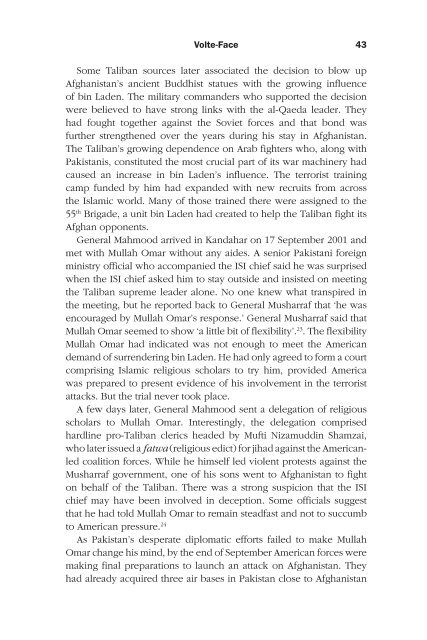Frontline Pakistan : The Struggle With Militant Islam - Arz-e-Pak
Frontline Pakistan : The Struggle With Militant Islam - Arz-e-Pak
Frontline Pakistan : The Struggle With Militant Islam - Arz-e-Pak
You also want an ePaper? Increase the reach of your titles
YUMPU automatically turns print PDFs into web optimized ePapers that Google loves.
Volte-Face<br />
Some Taliban sources later associated the decision to blow up<br />
Afghanistan’s ancient Buddhist statues with the growing influence<br />
of bin Laden. <strong>The</strong> military commanders who supported the decision<br />
were believed to have strong links with the al-Qaeda leader. <strong>The</strong>y<br />
had fought together against the Soviet forces and that bond was<br />
further strengthened over the years during his stay in Afghanistan.<br />
<strong>The</strong> Taliban’s growing dependence on Arab fighters who, along with<br />
<strong><strong>Pak</strong>istan</strong>is, constituted the most crucial part of its war machinery had<br />
caused an increase in bin Laden’s influence. <strong>The</strong> terrorist training<br />
camp funded by him had expanded with new recruits from across<br />
the <strong>Islam</strong>ic world. Many of those trained there were assigned to the<br />
55 th Brigade, a unit bin Laden had created to help the Taliban fight its<br />
Afghan opponents.<br />
General Mahmood arrived in Kandahar on 17 September 2001 and<br />
met with Mullah Omar without any aides. A senior <strong><strong>Pak</strong>istan</strong>i foreign<br />
ministry official who accompanied the ISI chief said he was surprised<br />
when the ISI chief asked him to stay outside and insisted on meeting<br />
the Taliban supreme leader alone. No one knew what transpired in<br />
the meeting, but he reported back to General Musharraf that ‘he was<br />
encouraged by Mullah Omar’s response.’ General Musharraf said that<br />
Mullah Omar seemed to show ‘a little bit of flexibility’. 23 . <strong>The</strong> flexibility<br />
Mullah Omar had indicated was not enough to meet the American<br />
demand of surrendering bin Laden. He had only agreed to form a court<br />
comprising <strong>Islam</strong>ic religious scholars to try him, provided America<br />
was prepared to present evidence of his involvement in the terrorist<br />
attacks. But the trial never took place.<br />
A few days later, General Mahmood sent a delegation of religious<br />
scholars to Mullah Omar. Interestingly, the delegation comprised<br />
hardline pro-Taliban clerics headed by Mufti Nizamuddin Shamzai,<br />
who later issued a fatwa (religious edict) for jihad against the Americanled<br />
coalition forces. While he himself led violent protests against the<br />
Musharraf government, one of his sons went to Afghanistan to fight<br />
on behalf of the Taliban. <strong>The</strong>re was a strong suspicion that the ISI<br />
chief may have been involved in deception. Some officials suggest<br />
that he had told Mullah Omar to remain steadfast and not to succumb<br />
to American pressure. 24<br />
As <strong><strong>Pak</strong>istan</strong>’s desperate diplomatic efforts failed to make Mullah<br />
Omar change his mind, by the end of September American forces were<br />
making final preparations to launch an attack on Afghanistan. <strong>The</strong>y<br />
had already acquired three air bases in <strong><strong>Pak</strong>istan</strong> close to Afghanistan













